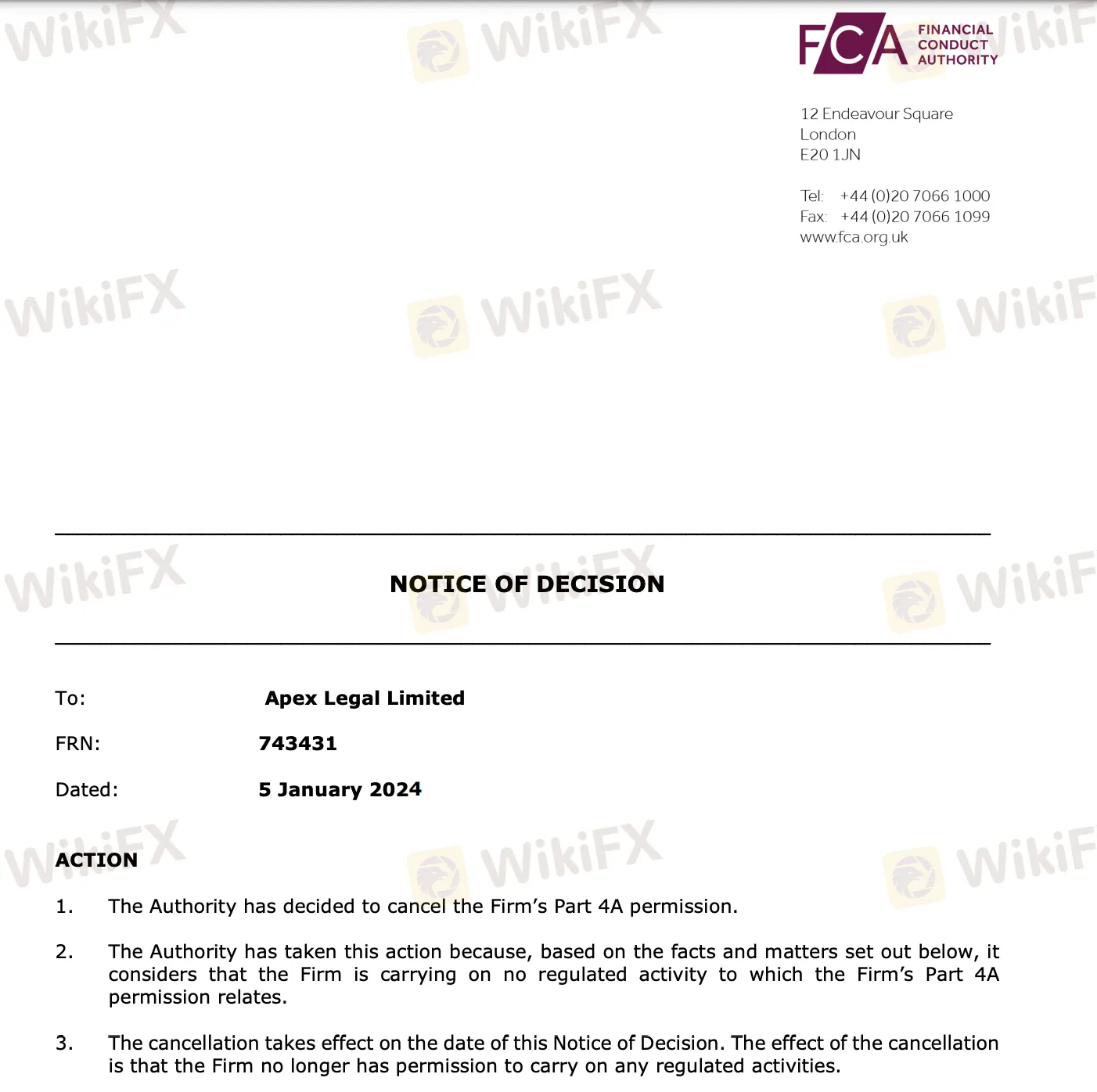简体中文
繁體中文
English
Pусский
日本語
ภาษาไทย
Tiếng Việt
Bahasa Indonesia
Español
हिन्दी
Filippiiniläinen
Français
Deutsch
Português
Türkçe
한국어
العربية
Apex Legal Limited Losses License
Abstract:Apex Legal Limited's recent license revocation by the UK's Financial Conduct Authority (FCA) on January 5, 2024, unveils regulatory concerns over the firm's lack of engagement in authorized activities, reflecting broader shifts in the FCA's approach towards ensuring active compliance in the financial sector.

The UK's Financial Conduct Authority (FCA) officially revoked Apex Legal Limited's Part 4A permission, effective January 5, 2024, as the Authority observed the firm's lack of engagement in any regulated activities covered by its Part 4A permission.
Apex Legal obtained FCA authorization on September 1, 2016, enabling specific regulated activities such as arranging investments, assisting in insurance contracts, acting as an agent in investments, organizing transactions in investments, and agreeing to regulated activity.
The FCA issued two notices to Apex Legal, expressing concerns about the firm's non-engagement in regulated activities aligned with its Part 4A permission and proposed cancellation. Despite these notices, Apex Legal did not take the required specified actions.

Information obtained from FCAs official website: https://www.fca.org.uk/publication/decision-notices/apex-legal-limited-2024.pdf
Consequently, the FCA decided to cancel Apex Legal's Part 4A permission. This decision aligns with the FCA's recent efforts to protect consumers by rescinding unused financial licenses across the UK. The regulatory changes empower the FCA to cancel licenses within 28 days, a significant shift from the previous 12-month timeline. This approach aims to ensure active participation in regulated activities by licensed firms, emphasizing the risk of losing licenses for non-compliance.
The FCA emphasizes that dormant licenses could mislead consumers, citing cases where firms with inactive licenses attracted investors to unregulated products, resulting in substantial financial losses. Recent data shows that in 2023, the regulator revoked licenses from 1,266 firms for failing to meet minimum authorization standards, indicating a doubled firm cancellation rate compared to the previous year.
In a landscape where financial regulations and firm compliance are crucial, staying informed is essential. To remain up-to-date with broker-related developments like this, leveraging the free WikiFX mobile application and official website is your best option. WikiFX serves as the ultimate destination for all broker-related inquiries and information. By downloading the app or visiting our official website, users gain access to comprehensive and real-time updates, making WikiFX your indispensable tool to navigate the dynamic world of brokers with confidence and clarity. Stay informed, stay empowered with WikiFX!

Disclaimer:
The views in this article only represent the author's personal views, and do not constitute investment advice on this platform. This platform does not guarantee the accuracy, completeness and timeliness of the information in the article, and will not be liable for any loss caused by the use of or reliance on the information in the article.
Read more

Investing Capital in Focus as Complaints on Withdrawal and Other Issues Mount
Explore this guide we have exposed Investing Capital, which has mounted concerns for traders by disallowing withdrawals and making them lose their hard-earned money.

4 Warning Signs That Indicate You May Get Scammed in Your Forex Investments
In this blog, we will share with you a guide telling you about the tactics fraudsters employ to dupe investors.

Global Brokers Vs. Indian Rules: Why They Struggle in India
RBI issued a warning last year against 75 forex brokers. Those brokers are globally popular and regulated in other countries, but they are banned in India. Only few brokers even have physical offices located in India. So, why do global brokers face so many challenges in entering the Indian market?

Aetos: A Closer Look at Its Licenses
With multiple regulatory entries and one license now revoked, Aetos stands as a broker requiring closer scrutiny from investors, particularly those prioritizing license scope and jurisdictional compliance.
WikiFX Broker
Latest News
Elon Musk's xAI raises $10 billion in debt and equity as it steps up challenge to OpenAI
European Central Bank's tightening cycle is done,' chief economist says
ACY Securities Expands Crypto CFD Offering with 24/7 Trading Access
Revelation: Makeup Artist, Social Media Influencer Involved in INR 1.62 Cr Forex Trading Scam
Social Trading Goes Mobile at M4Markets
Capital.com Strengthens UK FinTech Ties with Key Memberships
Crypto Craze Fizzling Out? Here is Why
10-year Treasury yield ticks higher as investors eye jobs report
Public companies bought more bitcoin than ETFs did for the third quarter in a row
Tokenized Stocks: Innovation or Just Another Wrapper?
Currency Calculator


